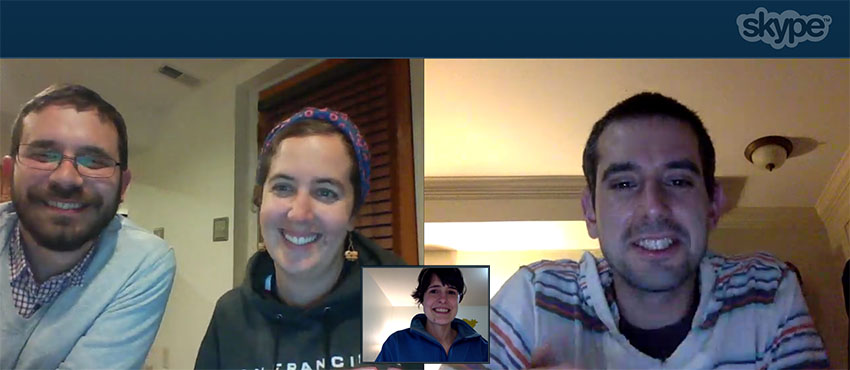The widespread access to the Internet became one of the biggest revolutions in modern era and, as part of that, language learning experienced a huge change: anybody could have a real time conversation with a native speaker of virtually any language in the world, hence quickly, easily, and in a very affordable way, improving her or his language skills. Currently, NABO is offering two Basque language classes via Skype, one for students in Rocklin, California, and another one for a group in Washington D.C. “I was afraid it was going to be a little bit chaotic, but it actually works perfectly well. It's very convenient,” said Beth Carmichael, from D.C., in conversation with EuskalKultura.com.
Washington D.C. At the moment, there are six Euskara students in Rocklin, California, improving their Basque language skills with the aid of Esther Ciganda. She is an example of a successful story of the Euskara Munduan program, which prepares language students to be teachers. The Moses Lake, Washington native nowadays resides in Hendaia, in the French side of Euskal Herria, and connects to Skype, once a week, to teach the language to her group in Rocklin.
The same way, on Tuesdays, seven students from Washington D.C. access the video-chat program to join a class taught by Oihana Andion−a Navarrese who currently lives in Boise, Idaho. “It's challenging,” says she. “But it's being a very positive experience, so far. It doesn't seem like we are so far away from one another.”
Of all the good things Andion sees in using Skype for language learning, she highlights the flexibility it provides: “You only need a connection to the Internet, it gives you great mobility. If you had to stay longer at work, for example, you can always take the class from the office, you don't miss it.” Beth Carmichael, one of her students, stated that “at the beginning, I was afraid it was going to be a little bit chaotic, but it actually works perfectly well. It's very convenient.”
Carmichael is originally from Chico, California but moved to Washington D.C. in 2013, alongside her boyfriend Markel Bilbao. He is from Getxo, in the westernmost part of Euskadi and, after a couple of trips, back and forth, between the Basque Country and the US, they both decided to settle down in the District. She works as a bilingual (Spanish and English) teacher at a kindergarten, and Bilbao is part of the communication department of SEIU (Service Employees International Union).
Pros and cons of the digital classroom
Bilbao misses a classic chalkboard where the teacher can write examples and explanations but, he also thinks that “the Skype chat works well for that, too.” Another snag could be that, to do exercises in groups, the conversation needs to be stopped, started over between the students of the group and, after a set amount of time, connect again with the whole class. But even that has a positive side: one can get up, stretch the legs, and even get a glass of water, before starting the exercise.
Beth also uses those moments to reflect upon what they've just learned, “and that's essential,” she thinks. Somehow, those intermissions give the students an instant to be alone and check their notes, a privilege that any language student knows is hard to get in a classroom.
Andion, from the teacher's standpoint, is also thankful for those short breaks because “an online class is more intense than a regular one.” “You need to have everything more structured and more material and exercises prepared.” At the end of the day, the teacher cannot disappear from the screen. And she puts the paradox into words: “The physical presence is more important in an online class.” For all that, dividing the Skype session in shorter sections is of help to everybody.
Students from the Smithsonian Institution
This year's Smithsonian Folklife Festival will feature the Basque culture and, committed to do their best, four workers enrolled in Andion's class, to wit: Mary Linn, Greyson Harris, Cristina Diaz-Carrera, and Anne Pedersen. “They're really willing to welcome as warmly as possible all the guests and participants,” pointed out the teacher.
This pleasant gesture from these workers could have not been possible had it not been for the Skype classes, since the Euskal Etxea of the capital city doesn't have a language program, at the moment.
* If you are interested in learning Euskara but there is not enough people or a teacher available in your area, please contact Itxaso Cayero, NABO's language coordinator, and she might be able to either put you in touch with an existing group or create a new one with other people that might also be interested: itxaso.cayero@boiseschools.org.






 Send to a friend
Send to a friend Add comment
Add comment








